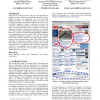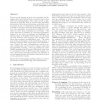45 search results - page 6 / 9 » How people use presentation to search for a link: expanding ... |
CHI
2004
ACM
14 years 6 months ago
2004
ACM
This paper presents a modified diary study that investigated how people performed personally motivated searches in their email, in their files, and on the Web. Although earlier st...
SIGIR
2011
ACM
12 years 9 months ago
2011
ACM
Web search behaviour studies, including eye-tracking studies of search result examination, have resulted in numerous insights to improve search result quality and presentation. Ye...
WWW
2004
ACM
14 years 7 months ago
2004
ACM
Some previous works show that a web page can be partitioned to multiple segments or blocks, and usually the importance of those blocks in a page is not equivalent. Also, it is pro...
WWW
2007
ACM
14 years 7 months ago
2007
ACM
Web sites are designed for graphical mode of interaction. Sighted users can "cut to the chase" and quickly identify relevant information in Web pages. On the contrary, i...
ADC
2009
Springer
14 years 26 days ago
2009
Springer
Tags in social tagging systems store meaning for the taggers who have entered them, and other users often share this understanding. The result of this, a folksonomy, is typically ...


